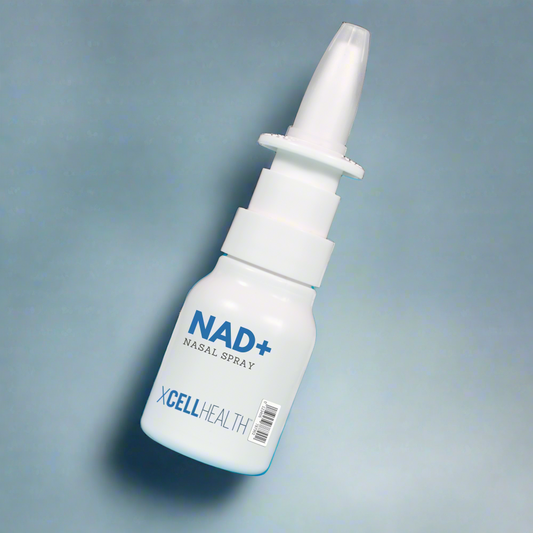-
Vitamin B12 Injections
Regular price $89.00 USDRegular price -
NAD+ Nasal Spray (Medical Grade)
Regular price $179.00 USDRegular price$200.00 USDSale price $179.00 USDSale
Collection: Cognitive Health
Cognitive health is essential for maintaining a high quality of life, as it plays a critical role in our mental processes, memory, decision-making, and learning abilities[1]. With the increasing prevalence of cognitive decline and neurodegenerative diseases, such as Alzheimer's and Parkinson's, it has become more important than ever to prioritize our cognitive well-being[2]. A healthy cognitive function ensures that we can effectively navigate our daily lives, make informed decisions, and engage in meaningful social interactions.
One way to support cognitive health is by boosting our levels of NAD+ (Nicotinamide adenine dinucleotide), a coenzyme found in all living cells[3]. NAD+ is involved in various biological processes, including energy production, DNA repair, and the regulation of circadian rhythms[4]. Research has shown that increasing NAD+ levels can have a positive impact on cognitive function, improve memory, and help protect against neurodegenerative diseases[5].

Sources:
[1] National Institute on Aging. (2017). What is cognitive health? Retrieved from https://www.nia.nih.gov/health/what-cognitive-health
[2] Alzheimer's Association. (2021). Alzheimer's disease facts and figures. Retrieved from https://www.alz.org/alzheimers-dementia/facts-figures
[3] Braidy, N., Berg, J., Clement, J., Khorshidi, F., Poljak, A., Jayasena, T., ... & Grant, R. (2019). Role of Nicotinamide Adenine Dinucleotide and Related Precursors as Therapeutic Targets for Age-Related Degenerative Diseases: Rationale, Biochemistry, Pharmacokinetics, and Outcomes. Antioxidants & Redox Signaling, 30(2), 251-294.
[4] Belenky, P., Bogan, K. L., & Brenner, C. (2007). NAD+ metabolism in health and disease. Trends in biochemical sciences, 32(1), 12-19.
[5] Hou, Y., Lautrup, S., Cordonnier, S., Wang, Y., Croteau, D. L., Zavala, E., ... & Bohr, V. A. (2018). NAD+ supplementation normalizes key Alzheimer’s features and DNA damage responses in a new AD mouse model with introduced DNA repair deficiency. Proceedings of the National Academy of Sciences, 115(8), E1876-E1885.


